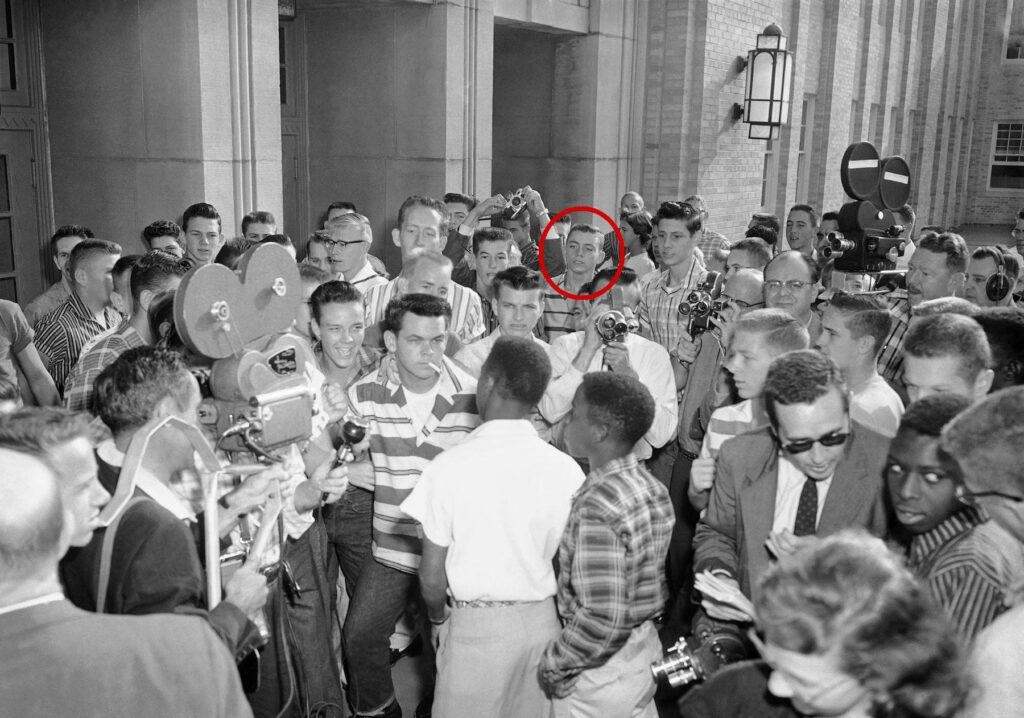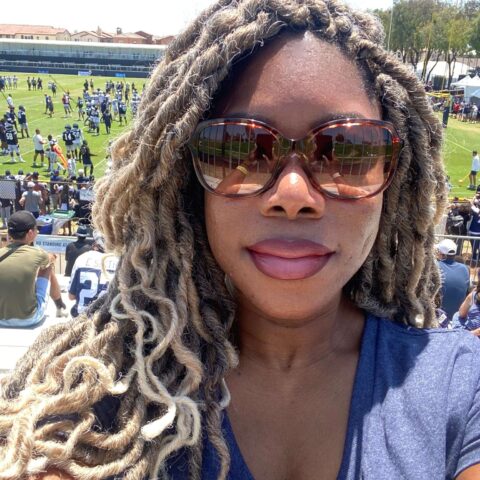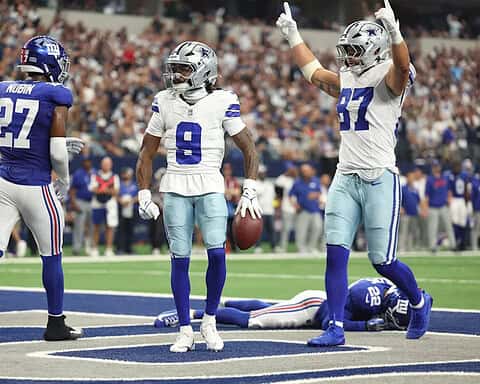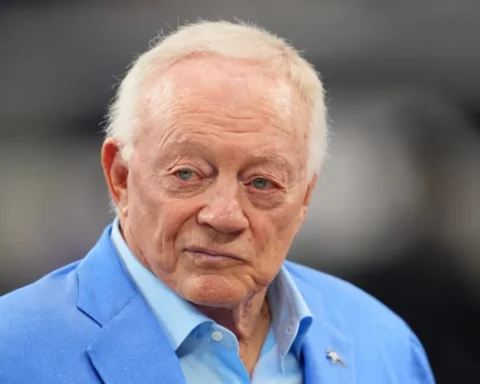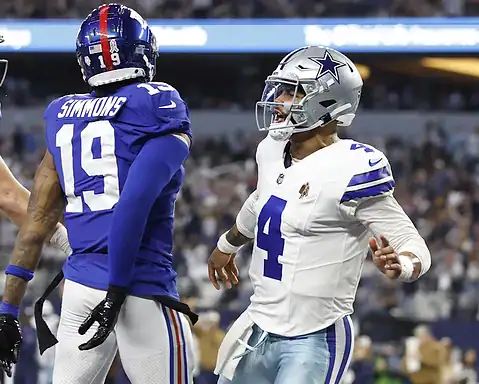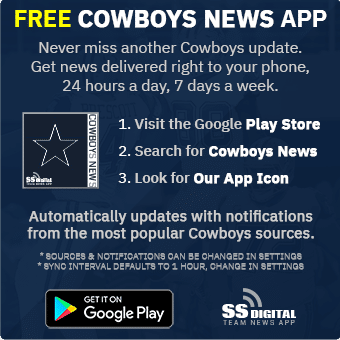Just over a week ago, on November 23, The Washington Post published an article with the headline, “Jerry Jones helped transform the NFL, except when it comes to race.” The visuals within this article received much more attention than the text. The introductory paragraphs described a confrontation that occurred 65 years ago, on Sept. 9, 1957 when a 14-year-old Jerral Wayne Jones was photographed “craning for a better view” of several of his white classmates in combative stances preventing six Black students from entering North Little Rock High.
Jerry Jones was already aware of the photo before it was published in The Washington Post. He told an Arkansas historian that he was in the photo and recalled several memories from that day including that he was a curious onlooker, not one of the instigators, and that his football coach had warned the entire team beforehand to stay away from the front of the school that day.
As the photo made its rounds, it spurred conversations on sports news and debate shows as well as social media about whether or not Jerry Jones should be held accountable for his presence during a racially charged conflict that occurred in his youth. Some people echoed the perspective of the Washington Post article – that the photo is supporting evidence of the idea that Jones plays a complicit role in systemic racism. Others, like Stephen A. Smith, argued that no conclusions could be drawn from the photo and that it’s illogical to hold someone accountable for being in the wrong place as a teenager. Some Cowboys fans even made a joke of the entire situation.
LeBron Speaks
When LeBron James entered the chat, he took the conversation in a different direction. During his postgame press conference, after Los Angeles defeated Portland on Wednesday, the Lakers small forward expressed his disappointment in the fact that no member of the media had asked him about the controversial photo of Jerry Jones.
“I got one question for you guys before you guys leave. I was thinking when I was on my way over here, I was wondering why I haven’t gotten a question from you guys about the Jerry Jones photo,” James said. “But when the Kyrie [Irving] thing was going on, you guys were quick to ask us questions about that.” The “Kyrie thing” he referenced was a recent situation that involved one of LeBron’s former teammates, Kyrie Irving, he was recently criticized and eventually suspended by the Brooklyn Nets for tweeting a link to a documentary that contained anti-Semitic tropes.
LeBron’s comments sparked a new conversation about the role of the media in addressing race related issues. They also added kindling to the lingering embers of the discussion about Jerry Jones’ obligation to hire Black coaches and speculation about his views on race.
Dak Responds
Any Cowboys fan who had been paying attention to the evolution of this discourse knew there was no way Dak Prescott’s next media day could come and go without a reporter asking for his thoughts on the matter. On Thursday, he was asked not about the photo of Jerry Jones specifically but about discussions of race in general. “Obviously we can be more empathetic and give grace to one another, regardless of race,” he responded.
As he made his way to discussing the headline-generating photo, Dak shed his usual cautious diplomat persona and admitted, “I don’t know if I’ve fully processed it all the way, honestly.”
Prescott did admit that some questions can only be properly addressed by Jerry Jones himself. He also reminded media members that they have to hold themselves accountable for how they cover race related issues. In the most earnest part of his response, the quarterback said,
“As I said I’m here for growth and giving grace and trying to make this world a better place. That’s who I am at my core and what I believe in. Unfortunate things come up from the past, pictures, and they show how far we’ve come, but at the same sense, they’re a reminder of how short of a time that was ago.”
His answer has garnered praise from many Cowboys fans who feel it was a great example of his leadership ability and why he’s good for the team.
Dak also mentioned that part of the reason he believes so much in “grace and change” is because without them, people would still be much more divided and he “wouldn’t be here.” The quarterback didn’t clarify whether he meant he wouldn’t exist (as a biracial American) or wouldn’t be the recognized leader of America’s Team. If he was referring to the latter, he would be another name on a long list of players who have publicly acknowledged their gratefulness to Jerry Jones and the Cowboys organization.
What Should Happen Next?
In the past, Jerry Jones has been described as “loyal to a fault” and has also been described by some players as a father figure. Those descriptions combined with common depictions of Jones as a shrewd business man point to the idea of Jones as someone more concerned with doing right by those closest to him than succumbing to the pressures of the public, fans, or the media. If it’s a different head coach that is being demanded, no one should expect that to happen any time soon. Outside of off-season gossip, there has been no indication that Mike McCarthy would not be the head coach of the Dallas Cowboys for the foreseeable future.
McCarthy has led the team to unanticipated success considering how the season started. Although not without their issues, the Cowboys have performed well under McCarthy compared to many NFL teams. The league as a whole may be receiving criticism for hiring practices, but that is not going to determine Jerry Jones’ head coaching decisions. One section of the Washington Post article even pointed out that Jones confessed to hiring people that he knows in that position.
So, then, what is there for Jerry Jones to do right now? Dak said the public should “look at the man’s resume since then.” Reading the Washington Post article in its entirety might give an idea of what would be included on that resume:
- the Cowboys’ all-Black strength and conditioning unit
- a coaching staff that is over 50% Black
- Cowboys-sponsored programs to train minority coaches
- Jones’ willingness to stick by Black players even after they’ve served prison time
- the fact that Jones was the only NFL team owner to agree to an in-depth conversation about Brian Flores’ racial discrimination suit
- the fact that he’s been the most honest about what it would take for the Rooney rule to actually work
- how he agreed to kneel with players during the national anthem after heeding the words of his Black VP of Player Personnel, Will McClay
- Jones’ own admission that neither the Cowboys nor the NFL have done enough with regards to racial equity.
The thing about grace and empathy are that they also require patience. Anyone employing the advice of Dak Prescott would have to allow Jerry Jones time to act and allow time to pass before drawing a conclusion. The team trusts Dak enough to follow his lead. In this case, it seems that Dak hopes fans will as well.
